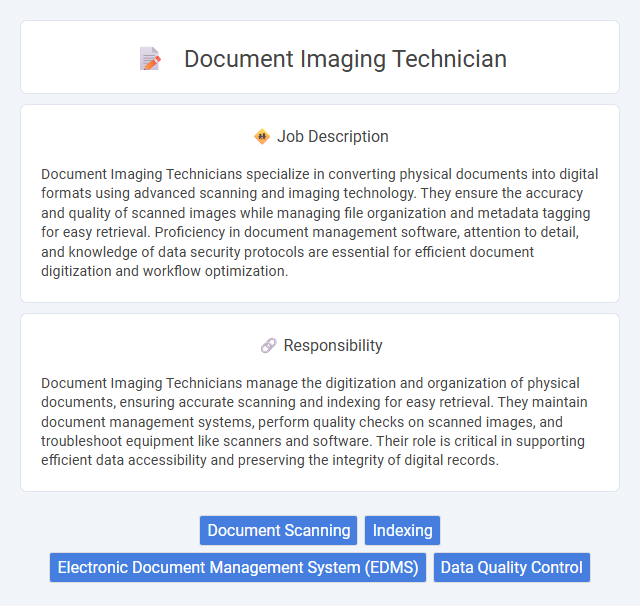
Document Imaging Technicians specialize in converting physical documents into digital formats using advanced scanning and imaging technology. They ensure the accuracy and quality of scanned images while managing file organization and metadata tagging for easy retrieval. Proficiency in document management software, attention to detail, and knowledge of data security protocols are essential for efficient document digitization and workflow optimization.
Individuals who prefer structured, detail-oriented tasks may find the Document Imaging Technician role suitable due to its focus on organizing and digitizing documents. Those who struggle with repetitive work or require varied social interaction might encounter challenges in this position. It is likely best suited for people comfortable with technology and maintaining accuracy under routine conditions.
Qualification
Document Imaging Technicians require proficiency in operating scanning equipment and advanced knowledge of document management systems. Strong attention to detail and experience with file organization software, such as Adobe Acrobat and OCR (Optical Character Recognition) technology, are essential. A background in data entry, information processing, or IT support enhances the ability to efficiently manage and digitize large volumes of documents.
Responsibility
Document Imaging Technicians manage the digitization and organization of physical documents, ensuring accurate scanning and indexing for easy retrieval. They maintain document management systems, perform quality checks on scanned images, and troubleshoot equipment like scanners and software. Their role is critical in supporting efficient data accessibility and preserving the integrity of digital records.
Benefit
Document Imaging Technicians likely experience benefits such as improved organizational efficiency and reduced paper clutter, which can lead to more streamlined workflows. There is a strong probability that this role offers exposure to advanced scanning and digital archiving technologies, enhancing technical skills valuable in many industries. Employees in this position may also benefit from opportunities to contribute to data security and information management improvements within their organizations.
Challenge
Document Imaging Technicians likely face challenges related to managing large volumes of digital files while ensuring accuracy and quality. The role may require adapting to evolving technologies and troubleshooting complex imaging systems to maintain efficient workflows. Balancing speed and precision probably presents ongoing difficulties in meeting organizational documentation standards.
Career Advancement
Document Imaging Technicians develop expertise in digital scanning, indexing, and electronic document management, positioning themselves for roles like Records Manager or Digital Archivist. Mastery of advanced imaging software and data security protocols significantly enhances career growth opportunities. Certifications such as Certified Document Imaging Architech (CDIA+) further accelerate progression into supervisory and IT-integrated roles.
Key Terms
Document Scanning
Document Imaging Technicians specialize in high-volume document scanning, converting physical files into accurate, searchable digital formats using advanced imaging equipment and software. They ensure image quality and data integrity by performing meticulous quality checks and applying optical character recognition (OCR) technology. Expertise in managing document indexing and maintaining secure digital archives is crucial for optimizing information retrieval and compliance.
Indexing
Document Imaging Technicians specialize in indexing by accurately categorizing and labeling digital documents for efficient retrieval in database management systems. They utilize Optical Character Recognition (OCR) technology and metadata tagging to enhance searchability and streamline document workflows. Proficiency in database software and attention to detail are critical for maintaining organized and accessible digital archives.
Electronic Document Management System (EDMS)
A Document Imaging Technician specializes in converting paper documents into digital formats using advanced Electronic Document Management Systems (EDMS) to ensure efficient storage, retrieval, and security of information. Proficiency in EDMS software like SharePoint, OpenText, or Laserfiche is essential for indexing, scanning, and organizing digital files to maintain compliance and improve workflow. Expertise in metadata tagging, quality control, and electronic archiving supports seamless document lifecycle management and enhances data accessibility across organizations.
Data Quality Control
Document Imaging Technicians specialize in converting physical documents into high-quality digital formats while ensuring data integrity. They perform rigorous Data Quality Control by verifying accuracy, completeness, and consistency of scanned images and metadata. Their role includes identifying and correcting errors to maintain reliable digital archives crucial for efficient information retrieval and compliance.
 kuljobs.com
kuljobs.com